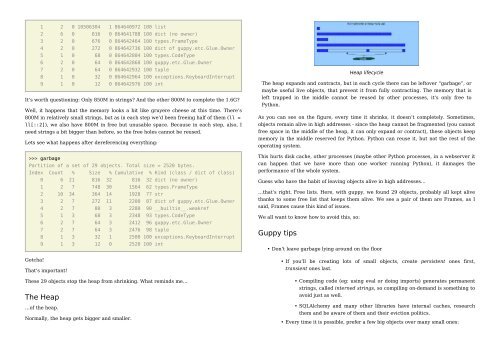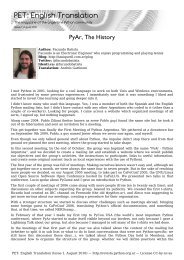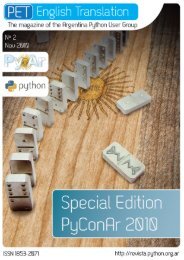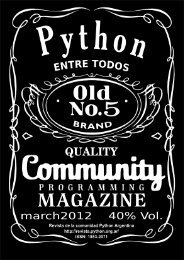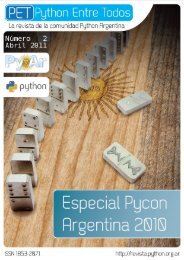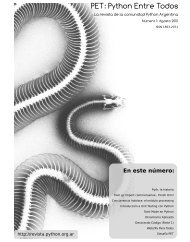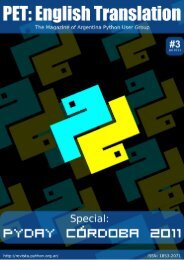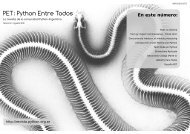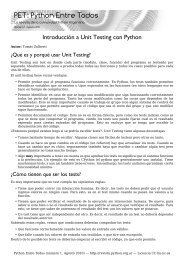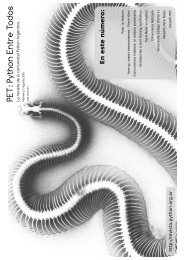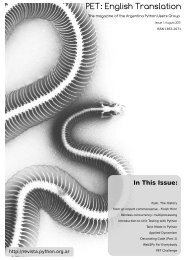color version - PET: Python Entre Todos - Python Argentina
color version - PET: Python Entre Todos - Python Argentina
color version - PET: Python Entre Todos - Python Argentina
You also want an ePaper? Increase the reach of your titles
YUMPU automatically turns print PDFs into web optimized ePapers that Google loves.
1 2 0 10506304 1 864640972 100 list<br />
2 6 0 816 0 864641788 100 dict (no owner)<br />
3 2 0 676 0 864642464 100 types.FrameType<br />
4 2 0 272 0 864642736 100 dict of guppy.etc.Glue.Owner<br />
5 1 0 68 0 864642804 100 types.CodeType<br />
6 2 0 64 0 864642868 100 guppy.etc.Glue.Owner<br />
7 2 0 64 0 864642932 100 tuple<br />
8 1 0 32 0 864642964 100 exceptions.KeyboardInterrupt<br />
9 1 0 12 0 864642976 100 int<br />
It’s worth questioning: Only 850M in strings And the other 800M to complete the 1.6G<br />
Well, it happens that the memory looks a bit like gruyere cheese at this time. There’s<br />
800M in relatively small strings, but as in each step we’d been freeing half of them (ll =<br />
ll[::2]), we also have 800M in free but unusable space. Because in each step, also, I<br />
need strings a bit bigger than before, so the free holes cannot be reused.<br />
Lets see what happens after dereferencing everything:<br />
>>> garbage<br />
Partition of a set of 29 objects. Total size = 2520 bytes.<br />
Index Count % Size % Cumulative % Kind (class / dict of class)<br />
0 6 21 816 32 816 32 dict (no owner)<br />
1 2 7 748 30 1564 62 types.FrameType<br />
2 10 34 364 14 1928 77 str<br />
3 2 7 272 11 2200 87 dict of guppy.etc.Glue.Owner<br />
4 2 7 80 3 2280 90 __builtin__.weakref<br />
5 1 3 68 3 2348 93 types.CodeType<br />
6 2 7 64 3 2412 96 guppy.etc.Glue.Owner<br />
7 2 7 64 3 2476 98 tuple<br />
8 1 3 32 1 2508 100 exceptions.KeyboardInterrupt<br />
9 1 3 12 0 2520 100 int<br />
Gotcha!<br />
That’s important!<br />
These 29 objects stop the heap from shrinking. What reminds me…<br />
The Heap<br />
…of the heap.<br />
Normally, the heap gets bigger and smaller.<br />
Heap lifecycle<br />
The heap expands and contracts, but in each cycle there can be leftover “garbage”, or<br />
maybe useful live objects, that prevent it from fully contracting. The memory that is<br />
left trapped in the middle cannot be reused by other processes, it’s only free to<br />
<strong>Python</strong>.<br />
As you can see on the figure, every time it shrinks, it doesn’t completely. Sometimes,<br />
objects remain alive in high addresses - since the heap cannot be fragmented (you cannot<br />
free space in the middle of the heap, it can only expand or contract), these objects keep<br />
memory in the middle reserved for <strong>Python</strong>. <strong>Python</strong> can reuse it, but not the rest of the<br />
operating system.<br />
This hurts disk cache, other processes (maybe other <strong>Python</strong> processes, in a webserver it<br />
can happen that we have more than one worker running <strong>Python</strong>), it damages the<br />
performance of the whole system.<br />
Guess who have the habit of leaving objects alive in high addresses…<br />
…that’s right. Free lists. Here, with guppy, we found 29 objects, probably all kept alive<br />
thanks to some free list that keeps them alive. We see a pair of them are Frames, as I<br />
said, Frames cause this kind of issues.<br />
We all want to know how to avoid this, so:<br />
Guppy tips<br />
• Don’t leave garbage lying around on the floor<br />
• If you’ll be creating lots of small objects, create persistent ones first,<br />
transient ones last.<br />
• Compiling code (eg: using eval or doing imports) generates permanent<br />
strings, called interned strings, so compiling on-demand is something to<br />
avoid just as well.<br />
• SQLAlchemy and many other libraries have internal caches, research<br />
them and be aware of them and their eviction politics.<br />
• Every time it is possible, prefer a few big objects over many small ones:


